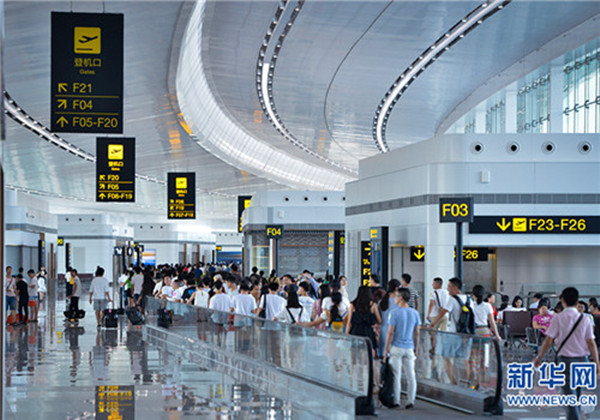Setting milestones in cultural exchange - Opening up to the outside world
By Lorella Brienza | chinadaily.com.cn | Updated: 2017-10-09 10:09
Setting milestones in cultural exchange
- Opening up to the outside world
 |
| Passengers head to the boarding gate at the East Terminal of Chongqing Jiangbei International Airport for a comprehensive rehearsal on July 21, 2017 [Photo by Li Xiangbo/Xinhua] |
In the past, I asked myself, “what did China do to become so successful in enhancing cultural exchange?” In order to find an answer to this question, I read as many stories as I could related to the Ancient Silk Road, Chinese philosophy and so on. I soon realized I was only focusing on the past, instead of looking to what was actually right in front of my eyes. What is the engine of cultural exchange? Curiosity. This is what pushes people to open to the outside world, to explore what is different from the “usual”. Curiosity is that innate and uncontrollable “thirst” to experience firsthand the various colors and shades this world has to offer; deeply-rooted in the human mind, this desire has led to new discoveries, as well as an understanding that “different” in most cases is not a synonym for bizarre, unsafe or abnormal.
So, again, what did China do? China is home to 56 ethnic groups which have different religious beliefs, languages and art forms, and this country has learned through the centuries how to cherish beauty and embrace the challenges that come with cultural diversity along the way. I believe that this history has helped China open up to the outside world. By “opening up” I am not referring only to favorable visa policies, scholarships for foreign students and specific incentives oriented toward those companies that are interested into investing in the PRC. Everybody is aware by now that an overall safe environment, a fully developed educational system and incredible economic growth have played an essential role in shaping the China that we all know. The factor I would like to stress instead is the “opening up”, because everything started from this. When I think about “opening up”,the first two words that come to my mind are “respect” and “inclusiveness”. China has opened up to the outside world with the utmost respect for people and by promoting inclusiveness and avoiding any kind of conflict which would undermine stability and peace.
Many countries have deliberately chosen to engage in cultural exchanges with China because they were treated respectfully; as a matter of fact, this world superpower has not tried to exert its influence in a negative way by making other countries feel “lesser” due to their size or economic status. Instead, China has always promoted mutual understanding and cooperation, acknowledging the enormous benefits that cultural exchange may bring. Cultural exchange is much more than tasting exotic foods, dressing in traditional clothes or grasping a new language. Cultural exchange is putting people in contact with other people, which can be rephrased as putting minds in contact with other minds. When people coming from different walks of life meet, when their minds interact, this is where the magic happens as new ideas flourish and some of those previously insurmountable obstacles can be overcome. Cultural exchange stresses the importance of creating a dialogue, listening to each other while in the meantime learning from one another.
In my opinion, China has succeeded in enhancing cultural exchanges with all the four corners of the world both by not putting itself on a pedestal and by being aware one cannot have all the answers. Throughout the years, China has been willing to absorb what others had to offer, and make remarkable contributions to the outside. The Belt and Road Initiative is the latest and clearest example of this. President Xi Jinping himself has declared that although the Belt and Road has been initiated by the PRC, it does not mean the country will seek hegemony nor classify other countries on a scale of importance; this initiative will function as an open platform for countries to enhance international cooperation and promoting people-to-people exchange, regardless of their economic status.
Apart from the clear benefits culture exchange brings, there are also plenty of challenges to face. These challenges may arise from different ways of thinking and can only be overcome by educating the young generations to favor dialogue, as well as peaceful and sustainable solutions, instead of quickly jumping to harsh methods. Educating the young generations to have genuine interest in other cultures, as well as self-respect and respect towards others is what makes the difference at the end of the day. This is no easy task, but China seems to be very determined in achieving international cooperation throughout mutual understanding.
Lorella Brienza is a Master student at Chongqing University with Chinese Government Scholarship. She has been living in China since 2015.
























